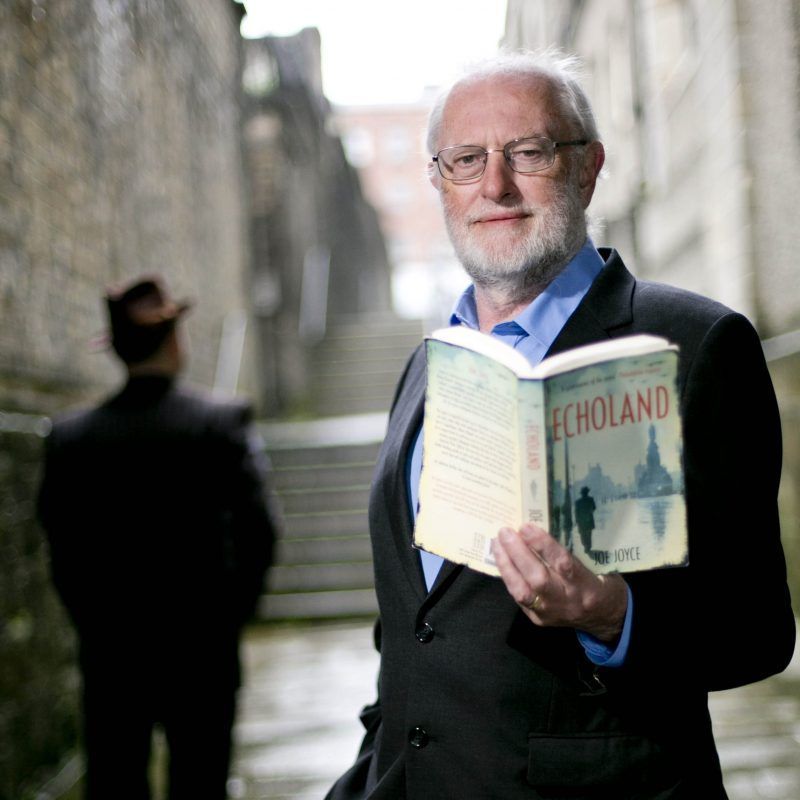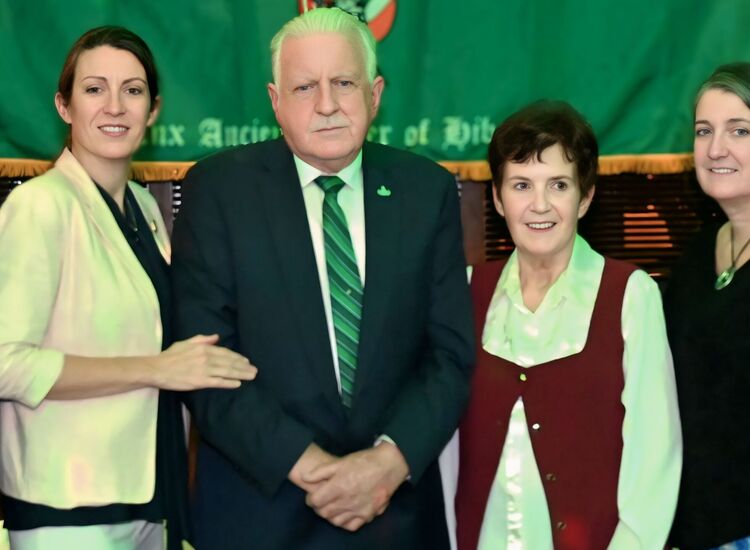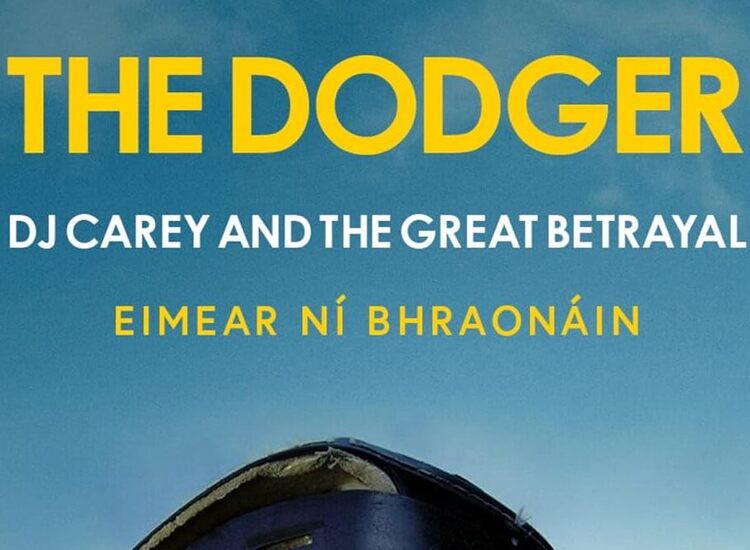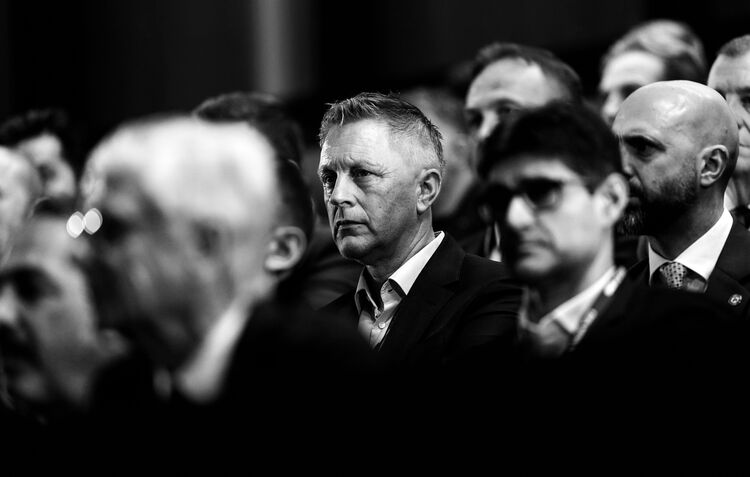Ireland just lost one of the most outstanding journalists of its last fifty years.
Here's what President Michael D. Higgins had to say of Joe Joyce: "Joe Joyce will be remembered by colleagues and the Human Rights community as an outstanding investigative reporter.
"Throughout his career, Joe Joyce showed a flair for challenging cases, putting a spotlight on injustice and helping campaigns for the undoing of damage to those wronged. I
"In particular, his vital reporting on cases such as the Sallins train robbery and the Kerry Babies, which required a courageous going against the grain of the taken for granted, will be recalled by activists for justice.
"His work as a journalist was informed by his background in sociology, but his other major subject, English, was drawn on for his work as an acclaimed novelist and playwright. May I extend my deepest sympathies to Joe's wife Frances, his daughters Catherine, Joanna and Molly, and to all his family, friends and colleagues."
The Irish Times, in a headline, described Joyce as a "Brilliant investigative reporter author and playwright."
And here's what the Times had to say: "Mr Joyce (77) twice won Journalist of the Year and was the author of seven historical and crime thrillers, including the Echoland trilogy of historical spy novels set in Dublin during the second World War.
"His first thriller, Off the Record, published in 1990, was set in the worlds of journalism and politics.
"He also wrote non-fiction works, including The Boss: Charles J. Haughey in Government, co-authored with fellow journalist Peter Murtagh. Published in 1983, the book focused on the 1982 government led by Mr Haughey.
"Both journalists had earlier co-authored Blind Justice, about the controversial Garda investigation and court cases following the 1976 Sallins mail train robbery.
"Two men charged in connection with the robbery were acquitted on grounds their statements were taken under duress while a third man, Nicky Kelly, was released on humanitarian grounds in 1984 and later received a presidential pardon. All three alleged they were beaten during interrogation by gardaí and signed statements under duress.
"Mr Joyce was also the author of a history/biography of the Guinness family and of a critically acclaimed play, The Tower, about James Joyce and Oliver St John Gogarty.
"He worked with several media organisations during a long career, including The Irish Times, where he was a staff reporter, and contributed to the From The Archives column for many years.
"He was Dublin correspondent of the Guardian newspaper and also worked with the Reuters news agency. During his journalistic career, he won Journalist of the Year twice.
"With fellow journalists Don Buckley and Renagh Holohan, he broke the story about the existence of a ‘heavy gang’ within An Garda Síochána.
"In 1984, he and Don Buckley wrote a story that led to the setting up of the Kerry Babies tribunal of inquiry.
"Published just days after a Garda case against Joanne Hayes and her family was dropped, the story criticised both the Garda interrogation of the family and the Garda theory concerning the April 1984 discovery of a newborn baby’s body, with multiple stab wounds, on White Strand beach, Cahirciveen, Co Kerry, and the separate uncovering, two weeks later, of the body of another baby boy on the Hayes family farm at Abbeydorney.
"In 2020, the State apologised to Ms Hayes for wrongly accusing her of the murder of the Cahirciveen baby and for the “appalling hurt and distress caused”.
"Mr Murtagh and Geraldine Kennedy, a former editor of The Irish Times, were both close friends of Mr Joyce and expressed sorrow on Thursday at the news of his death.
"Mr Murtagh described Mr Joyce as 'a brilliant investigative reporter and story teller and a great colleague' who was 'very thoughtful and brought a really deep political understanding and nous to our work.'
"Ms Kennedy said Mr Joyce was 'a very good friend and colleague' from whom she had learned a lot and received “'the most wonderful training' when she joined The Irish Times. 'He maintained a huge interest in current affairs right up to the end,' she said.
"Mr Joyce, a native of Ballinasloe, Co Galway, pursued a career in journalism after studying English and Sociology at University College Galway. He lived in Sandycove, Co Dublin, and died early on Thursday, having been ill for a time. He is survived by his wife, journalist Frances O’Rourke, and their three daughters: Catherine, Joanna and Molly."
And here's what I have to say. For starters, Joe gave me my first job in journalism, as a reporter with a weekly paper in Dublin called "Southside."
"Southside" was a free paper, but one with an extraordinary degree of success in terms of reaching the homes of its readers. It was founded by a group of Irish Times executives and the first editor was Joe. The aforementioned Peter Murtagh and Don Buckley (who would succeed Joe Joyce as editor) also worked at the paper, as did other leading Irish journalists such as Don Lavery, Louise Creagh and June Levine.
The very first investigations into planning corruption in Dublin took form at "Southside," with Peter Murtagh leading the charge.
At the time, and this was 1979, I was on the hunt for a newspaper job after college. Prospects did not look good until Southside published an ad looking for a general news reporter. Not expecting much I responded.
Soon enough I got a phone call from Joe. Come on in for a chat, he said. He didn't have to ask twice.
I found Joe sitting behind his desk puffing on his pipe. You wouldn't call him tidy. His desk was classic newspaperman - a mess.
Joe was soft spoken. He was welcoming and curious. After explaining myself he said that he would give me a try out. That consisted of two stories. I could take a week, or more time if needed, and I only had to do one of the stories. I could take my pick.
I thanked him and left the Southside office thinking to myself that Joe was playing some kind of trick. He really wanted me to do both stories and if I only did one my prospects for a job would be out the window. I resolved to cover both stories, and to do so in less than a week.
I can't for the life of me remember one of those stories, but the other one is clear in my mind all these years later.
It involved a new housing estate where the posts and telegraphs people had laid phone lines under the sidewalks but had neglected to link those main connections with the actual houses. All these folks in their new homes had no phones. And remember, this was years before cellphones. It was landlines or bust. And this was a bust.
So off I went on my bike to knock on doors. Homeowners, not surprisingly, were eager to talk and complain. One guy asked me in for a drink. I was polite and declined but he insisted and poured a serious amount of vodka. He was merchant sailor and obviously lived a topsy turvy life in terms of hours. To be polite, and to encourage him to talk, I sipped from the glass. I didn't have to encourage him much. He was quickly off to the races.
A few doors down a woman invited me in so she could tell her story. She worked for Aer Lingus. It was crucial to have a phone because of duty rosters and changes in them. She made a pot of tea and produced a fruit cake. I drank tea, ate cake, and scribbled down her story.
Then she jumps up and tells me that she has to go to Dublin Airport. But I was to stay and finish my tea and cake at my leisure. Just make sure to lock the front door when you leave, she instructed. And off she went. I drank my tea, and if I was about my business I'm sure I had an extra slice of cake.
On my way back home I was thinking to myself what a strange business this journalism thing was. Then it started lashing rain and I got a flat tire. And then I was thinking that perhaps I should become a teacher like my dad.
The issue was decided the following day. I reported to Joe with both stories. He took both without commentating, making a fuss, or lavishing praise. He said he would be in touch.
The following week the stories appeared in Southside. Then I got a call from Joe summoning me for a meeting with the paper's publisher, Andrew Whittaker. A few days after that I got another call from Joe. I was offered the job which was duly confirmed with a letter of employment.
In the days that followed Joe would deliver sage advice on newspapering between puffs on his pipe, always in that quiet spoken, low key manner of his. You would never think that, along with Peter Murtagh, here was one half of what would be, during the1980s and beyond, the Irish version of Woodward and Bernstein.
Joe Joyce: gentleman, scholar, fearless reporter, and custodian of a messy desk. RIP.








